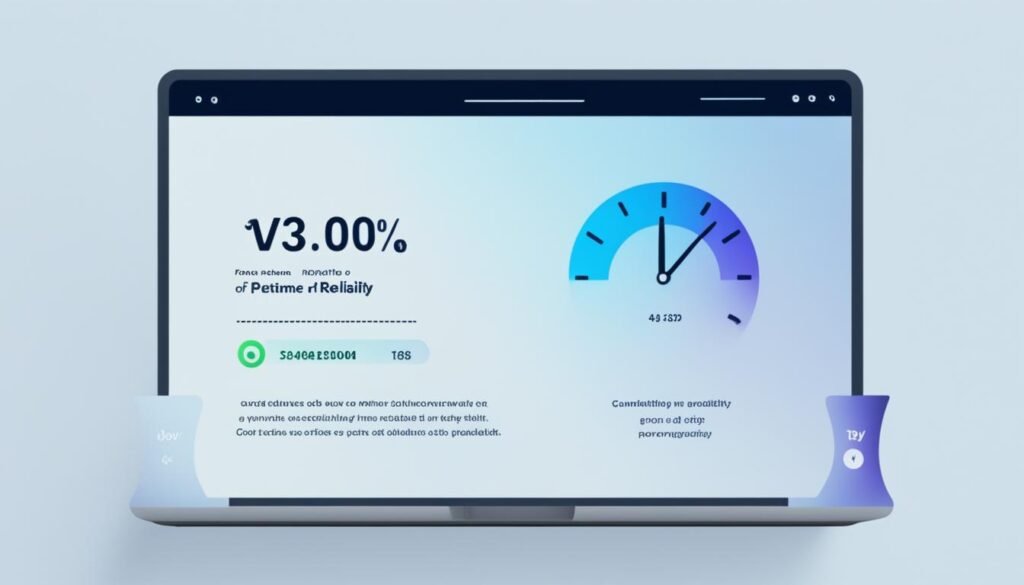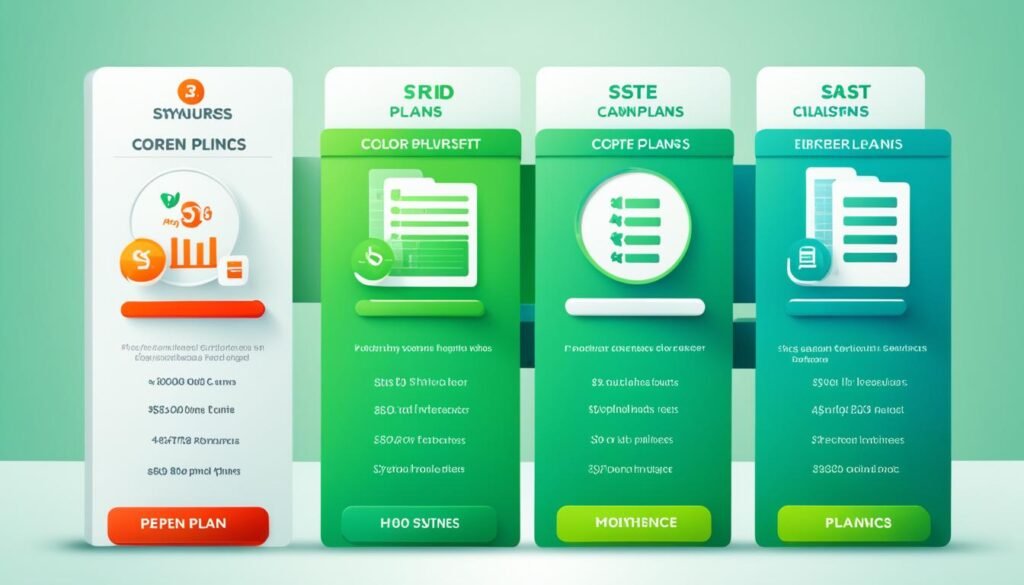When it comes to creating a website, one of the most important decisions you’ll need to make is choosing the right web hosting service. Web hosting services provide the technologies and resources necessary to view websites online, making them a crucial part of your online presence.
However, with numerous web hosting providers out there, navigating the choices can be daunting. It’s important to find the best hosting plan that suits your unique needs and goals. To help you make an informed decision, this guide combines in-depth analysis and hands-on experience to help you choose the optimal hosting service.
In this article, we’ll cover everything you need to know about choosing the best hosting plan. From performance and reliability to customer support and pricing, we’ll explore the key factors you should consider to ensure your website is hosted effectively. By the end, you’ll have the knowledge and confidence to make the right choice for your website hosting needs.
Key Takeaways: Best Hosting Plan
- Choosing the right web hosting service is crucial for your website’s success.
- Consider your website’s specific needs and goals when evaluating hosting options.
- Reliability and uptime are essential factors to ensure your website is always accessible.
- Website performance and speed affect user experience and search engine optimization.
- Customer support and technical assistance play a vital role in resolving any issues.
Determine Your Website Needs And Goals
When building a website, it is essential to carefully assess its specific purpose and requirements. Consider the type of website you are building and evaluate its needs and goals. This evaluation will not only shape the overall structure and design of your website but also guide your decision-making process when choosing a web hosting provider.
One of the key factors to consider is the anticipated traffic volume. Analyze the expected number of visitors your website will receive on a regular basis. This assessment will help you determine the required resources and the level of scalability your hosting plan needs to support. Scaling up your website to accommodate high traffic volumes without experiencing performance issues is crucial for providing a smooth user experience.
In addition to traffic volume, identify any specific features or technologies that your website requires. Are you planning to incorporate interactive elements, e-commerce functionality, or multimedia content? Assessing these needs will enable you to choose a hosting provider that offers the necessary resources and supports the technologies essential for your website’s functionality.
Consider the following when determining your website needs and goals:
- Traffic volume: Analyze the expected number of visitors to your website to ensure it can sustain the anticipated traffic without experiencing performance issues.
- Resource requirements: Evaluate the resources your website requires to function optimally, such as storage space, bandwidth, and processing power.
- Specific features or technologies: Identify any unique features or technologies your website will incorporate to ensure compatibility with your chosen hosting provider.
By thoroughly assessing your website’s needs and goals, you can select a hosting plan that aligns with your requirements. Choosing a hosting provider that caters to your specific website requirements will set the foundation for success and ensure a seamless online experience for your visitors.
Reliability And Uptime

When choosing a web hosting provider, one of the crucial factors to consider is their reliability and uptime. A reliable hosting provider ensures that your website remains accessible to visitors around the clock, minimizing the risk of downtime that can adversely affect your online presence and business.
It is essential to look for a web host with a minimum uptime guarantee of 99.9%. This guarantee ensures that your website will be up and running for at least 99.9% of the time. A high uptime guarantee demonstrates the hosting provider’s commitment to keeping your website available to visitors consistently.
Additionally, consider the hosting provider’s track record in meeting or exceeding their uptime guarantee. Look for customer reviews and testimonials that provide insights into the provider’s reliability and consistent uptime. Positive feedback from existing customers indicates that the hosting provider is trustworthy and delivers on their uptime promise.
To further enhance reliability, reliable hosting providers invest in redundant power sources and backup systems. These measures reduce the risk of downtime caused by power outages or technical failures. Redundancy ensures that even if one power source fails, there is a backup system in place to maintain uninterrupted service.
Gaining the confidence of visitors and potential customers relies on maintaining a website with high uptime and reliability. It is crucial to choose a hosting provider that prioritizes uptime and has a proven track record of delivering it consistently.
This image visually represents the importance of website uptime for your online presence and user experience. Optimal uptime ensures that your website remains accessible to visitors without interruptions, facilitating smooth navigation and interaction.
| Benefits of choosing a reliable hosting provider with high uptime: |
|---|
| Improved user experience: High uptime ensures that visitors can access your website whenever they want, leading to positive user experiences and increased engagement. |
| Enhanced SEO performance: Search engines prioritize websites with good uptime, as it demonstrates reliability and accessibility. A high uptime contributes to better search engine rankings and increased organic traffic. |
| Minimal revenue loss: Downtime can result in missed opportunities, especially for e-commerce websites. By choosing a reliable hosting provider with high uptime, you can minimize the risk of revenue loss due to downtime. |
| Positive brand reputation: A website that consistently delivers great user experiences builds a positive brand reputation. Reliability and uptime contribute to customer trust and loyalty. |
Performance And Speed

Ensuring optimal website performance and speed is crucial for enhancing user experience and boosting search engine optimization. When selecting a web hosting provider, prioritize those that prioritize fast-loading websites and employ solid-state drives (SSDs) and content delivery networks (CDNs) to optimize speed and reduce latency.
Fast-loading websites not only provide a seamless browsing experience for users but also contribute to higher search engine rankings. Solid-state drives (SSDs) significantly improve data transfer speeds compared to traditional hard disk drives (HDDs), resulting in quicker website loading times.
Content delivery networks (CDNs) further enhance website speed by distributing website content across multiple servers worldwide. This ensures that website visitors can access the website from the server closest to their geographic location, reducing latency and improving loading times.
By choosing a web hosting provider that prioritizes performance and utilizes SSDs and CDNs, you can create a website that loads quickly and enables visitors to navigate seamlessly.
Scalability and Flexibility
When considering website performance and speed, it’s important to also evaluate the scalability and flexibility of the hosting plans offered by the provider. As your website grows, you may need additional resources to accommodate increased traffic and content.
A provider that offers scalable hosting plans allows you to easily upgrade your resources without any disruptions. This ensures your website can handle higher visitor traffic and maintain optimal performance even during peak periods.
Flexibility is also important, especially if you anticipate changes in your website’s requirements or technologies. Look for hosting providers that offer a range of hosting options such as shared hosting, virtual private servers (VPS), or cloud hosting. These options provide the flexibility to adapt to your evolving needs and ensure consistent website performance.
Consider the scalability and flexibility of the hosting plans when choosing a web hosting provider to ensure your website can grow and adapt while maintaining optimal speed and performance.
| Factors Impacting Website Performance | Importance |
|---|---|
| Fast server response times | High |
| Optimized website code and scripts | High |
| Efficient server-side caching | High |
| Compressed and optimized images and multimedia | High |
| Utilizing content delivery networks (CDNs) | High |
| Using solid-state drives (SSDs) | High |
| Minimizing external scripts and dependencies | Medium |
| Browser caching and compression | Medium |
| Website optimization plugins and tools | Medium |
| Minimizing the use of redirects | Medium |
Customer Support And Technical Assistance

When it comes to web hosting, reliable customer support and technical assistance are essential. Whether you’re a seasoned webmaster or a beginner, having access to accessible and responsive support can make all the difference when issues or questions arise.
Choose a web hosting company that offers 24/7 customer support and multiple support channels:
- Live Chat: Instantly connect with a support representative who can assist you in real-time.
- Phone Support: Speak directly with a knowledgeable support agent who can address your concerns and provide personalized assistance.
- Ticket Systems: Submit a support ticket and receive timely responses from the hosting company’s support team.
In addition to these support channels, many web hosting providers offer valuable resources to help you troubleshoot and find solutions on your own. These include:
- Comprehensive Knowledge Bases: Access a wealth of articles, tutorials, and guides that cover a wide range of topics and common issues.
- Tutorials and Video Guides: Step-by-step instructions and video guides that walk you through various tasks, such as website setup and management.
- Community Forums: Engage with a community of fellow website owners and hosting experts to seek advice, share experiences, and find solutions together.
Having multiple support channels and additional resources ensures that you can get the assistance you need, regardless of your technical expertise.
Accessible and responsive customer support is crucial when issues or questions arise.
With reliable customer support and technical assistance, you can have peace of mind knowing that help is just a click, call, or ticket away. Whether you need help with website setup, troubleshooting, or any other hosting-related concerns, a hosting provider that prioritizes customer support can help you navigate challenges smoothly.
Pricing And Plans

While pricing is an important factor in choosing a web hosting provider, it should not be the sole determining factor. It is essential to consider the value for money that a hosting provider offers. It is recommended to compare the features, resources, and support provided by different hosting providers to determine the best fit for your needs.
“When it comes to web hosting, it’s not just about the price, but the overall value you receive for what you pay.”
When evaluating pricing and plans, be cautious of any hidden costs that may not be immediately apparent. Some hosting providers may advertise low initial prices to attract customers, only to raise the prices upon renewal or charge additional fees for certain services. It’s crucial to carefully review the terms and conditions to ensure transparency and avoid any unforeseen expenses.
Consider the following factors when assessing the pricing and plans of hosting providers:
- Features: Compare the features included in different hosting plans. Look for offerings such as unlimited bandwidth, storage space, email accounts, and website builders.
- Resources: Consider the resources available, including CPU, RAM, and storage allocation. Ensure that the resources provided align with the needs of your website.
- Support: Evaluate the quality of customer support and technical assistance offered. Look for providers that offer 24/7 support and multiple support channels.
To make an informed decision, it is recommended to weigh the overall value and affordability of the hosting plans. Remember, the cheapest option may not always provide the necessary resources and support for your website’s success.
Price Comparison of Leading Hosting Providers
| Hosting Provider | Price (Per Month) | Features | Support |
|---|---|---|---|
| HostGator | $2.75 | Unlimited bandwidth, storage space, email accounts, website builder | 24/7 live chat, phone support, knowledge base |
| Bluehost | $3.95 | Unlimited bandwidth, storage space, email accounts | 24/7 live chat, phone support, ticket system |
| SiteGround | $6.99 | 10GB storage space, unlimited bandwidth, email accounts | 24/7 live chat, phone support, email support |
Consider the features, support, and price of each hosting provider to determine the best value for your money. It’s also advisable to read customer reviews and testimonials to gain insights into the overall satisfaction and reliability of the hosting provider.
Security And Backups

Ensuring the security of your website is crucial in today’s digital landscape. When selecting a hosting provider, it’s essential to thoroughly assess the security measures they have in place to protect your website and sensitive data.
Website Security:
- Check if the hosting provider utilizes firewalls to shield your website from unauthorized access.
- Look for regular malware scanning and removal to prevent potential security breaches.
- Inquire about the provider’s SSL certificate offerings to ensure secure data transmission between your website and its visitors.
Automated Backups:
- It’s crucial to have automated backups to prevent the loss of valuable data in the event of a server failure or website compromise.
- Verify if your hosting provider offers automated backup options to regularly save copies of your website’s files and databases.
- Consider restoration options provided by the hosting company to ensure seamless recovery in case of data loss.
Data Protection and Industry Standards:
- Assess the hosting provider’s data protection policies, including privacy practices and compliance with industry standards such as GDPR.
- Look for measures to protect your website from cyber threats, such as server monitoring and intrusion detection systems.
By selecting a hosting provider with robust security measures and automated backup options, you can protect your website from potential risks and ensure the safety of your valuable data.
| Security Measures | Features |
|---|---|
| Firewalls | Protection against unauthorized access |
| Malware Scanning | Regular scanning and removal of malicious software |
| SSL Certificates | Secure data transmission between website and visitors |
| Automated Backups | Regularly saving copies of website files and databases |
| Data Protection Policies | Privacy practices and compliance with industry standards |
| Server Monitoring | Continuous monitoring to detect and prevent security breaches |
Scalability And Flexibility

When choosing a web hosting provider, it’s crucial to consider the scalability and flexibility they offer. A scalable website hosting solution allows your website to easily handle growth and adapt to changes in traffic volume, ensuring a seamless user experience. Flexible hosting plans ensure that you have the freedom to upgrade or downgrade your resources as needed, without being locked into a rigid plan that may not meet your evolving needs.
Look for hosting providers that offer scalable solutions like cloud hosting or virtual private servers (VPS). Cloud hosting, with its distributed infrastructure, allows for easy scaling by adding or removing resources based on demand. Virtual private servers provide dedicated resources that can be adjusted to meet your website’s specific requirements.
Consider the hosting provider’s track record in handling scalability and their ability to handle traffic spikes without compromising website performance. A robust infrastructure, backed by powerful servers and reliable data centers, ensures that your website remains stable and accessible even during periods of high traffic.
Benefits of Scalability and Flexibility:
- Improved website performance and user experience
- Ability to handle traffic spikes without downtime or performance issues
- Cost-effective resource allocation
- Flexibility to adjust resources based on changing needs
- Future-proofing your website for growth and expansion
A scalable and flexible hosting solution is vital for businesses and websites that anticipate growth or experience seasonal traffic fluctuations. It provides the foundation for a reliable and responsive online presence, ensuring that your website can effectively support your business objectives.
By choosing a hosting provider that prioritizes scalability and flexibility, you can future-proof your website, accommodate growth, and adapt to changing requirements without the need for disruptive migrations or costly upgrades.
| Benefits | Scalability | Flexibility |
|---|---|---|
| Improved Performance | ✅ | ✅ |
| Traffic Handling | ✅ | ✅ |
| Cost-Effective | ✅ | ✅ |
| Resource Allocation | ✅ | ✅ |
| Future-Proofing | ✅ | ✅ |
Control Panel And User Interface

When selecting a web hosting provider, one of the essential aspects to consider is the quality and usability of the control panel and user interface. A user-friendly control panel can greatly simplify website setup and management, allowing you to efficiently handle various aspects of your website without any technical hassle. It provides you with a centralized hub from where you can access crucial features and tools to streamline your website management process.
Look for a web hosting provider that offers an intuitive control panel with a user-friendly interface. A well-designed control panel should be easy to navigate and understand, even for users with minimal technical knowledge. It should offer clear and logical options, allowing you to quickly and effortlessly perform essential tasks.
One-click installations are another valuable feature to consider in a control panel. It allows you to easily install popular web applications, such as CMS platforms or e-commerce software, with just a single click. This saves you time and effort in the website setup process, enabling you to focus more on creating the content and customizing the design of your website.
The compatibility of the control panel with your website development preferences is crucial. If you are using a specific website building platform or programming language, ensure that the control panel supports it. This ensures smooth integration and minimizes any potential compatibility issues.
Remember that the control panel will be your primary interface for managing your website, so it’s essential to choose one that suits your needs and preferences. Take the time to explore demos or screenshots of the control panel provided by the hosting provider to get a feel for its design and functionality.
Overall, a user-friendly control panel plays a vital role in website management, allowing you to efficiently control and customize various aspects of your site. It simplifies the management process, even for non-technical users, enabling you to focus more on creating great content and growing your online presence.
SFTP Access and Email Addresses

When choosing a web hosting provider, it’s important to consider the accessibility and functionality they offer. Two key aspects to consider are SFTP access for website management and email addresses for your domain.
SFTP access allows you to securely transfer files between your local computer and the server where your website is hosted. It’s essential for easily updating, modifying, or uploading files to your website without compromising security.
Additionally, having email addresses associated with your domain can give your business a more professional appearance. Instead of using generic email providers, such as Gmail or Yahoo, having domain-specific email addresses adds credibility and consistency to your brand.
When assessing hosting providers, make sure they offer easy and secure SFTP access as a standard feature. This ensures that you can efficiently manage your website files and maintain control over your online presence.
Regarding email addresses, some hosting providers include email hosting as part of their packages, allowing you to create domain-specific email accounts on your hosting plan. This can be advantageous as it simplifies management by having both website hosting and email hosting in one place.
However, there are also dedicated email hosting services available that specialize in delivering reliable and secure email services. These services may provide additional features, such as advanced spam filtering and enhanced security measures, giving your business peace of mind.
When deciding whether to combine email hosting with web hosting or opt for a separate email hosting service, consider the advantages and disadvantages of both options. Assess factors like pricing, storage limits, security features, and the level of customer support offered by each provider.
It’s worth noting that combining email hosting and web hosting can have its challenges. If there are issues affecting one service, such as server downtime or maintenance, it could potentially impact the other. Be sure to look for hosting providers that implement measures to mitigate such situations and ensure minimal disruption to your online operations.
In summary, when evaluating web hosting providers, consider the availability of SFTP access for website management and the options for domain-specific email addresses. Assess the advantages and disadvantages of combining email hosting with web hosting, and choose the solution that best fits your needs while providing convenience, security, and reliability.
Site Backups
Ensuring regular website backups is crucial for safeguarding your online presence. When selecting a web host, it is essential to check if they offer convenient backup options to protect your valuable website data. Look for providers that offer automated backup features and one-click backup options.
Automated daily backups are ideal as they provide the most up-to-date copies of your site’s content and ensure minimal data loss in case of accidents or security breaches. With automated backups in place, you can rest easy knowing that you have spare website copies readily available for restoration.
Here’s an example of how automated backups can provide peace of mind:
John, a small business owner, recently experienced a major website crash due to a malicious cyber attack. Fortunately, he had chosen a web host that offered automated daily backups. With just a few clicks, he was able to restore his website to its previous state and minimize the downtime. Without regular backups, John would have faced significant losses in terms of time, money, and reputation.
By prioritizing website backups and opting for automated backup options, you protect your website against any unforeseen events or security vulnerabilities, ensuring your online presence remains secure and accessible.
For further insights, refer to the table below that highlights the importance of automated website backups:
| Benefits of Automated Website Backups | Explanation |
|---|---|
| Protection against data loss | Regular backups ensure that even if your website experiences a technical glitch, data breach, or accidental data deletion, you can easily restore your site to a previous functioning state. |
| Quick recovery in emergencies | In the event of a website crash or security breach, automated backups allow for swift restoration, minimizing downtime and reducing the negative impact on your business or online presence. |
| Peace of mind | Knowing that your website is regularly backed up provides peace of mind, allowing you to focus on other aspects of managing your online presence. |
Also Read: Which hosting is better than Bluehost?
Conclusion
Choosing the best web hosting provider is a critical decision that can determine the success of your online presence. By considering factors such as reliability, performance, security, and support, you can make an informed choice that aligns with your website needs and goals.
When evaluating hosting options, it is essential to assess the provider’s reliability and uptime track record. Look for a web host that guarantees a minimum uptime of 99.9% and has a reputation for consistently delivering on that promise. Additionally, prioritize web hosting companies that offer robust security measures, such as firewalls and regular malware scanning, to protect your website and data.
Performance and speed are key factors in providing an optimal user experience. Look for a hosting provider that prioritizes fast-loading websites, utilizes solid-state drives (SSDs), and offers content delivery networks (CDNs) to reduce latency and optimize speed. Scalability and flexibility should also be considered, as you want a hosting solution that can accommodate the growth of your website without compromising its performance.
Lastly, excellent customer support and technical assistance are crucial. Choose a web hosting provider that offers multiple support channels and is available 24/7. Accessible and responsive customer support ensures that you can get assistance whenever you need it. Additionally, carefully review pricing plans to ensure that you are getting the best value for your money, avoiding hidden costs or variations in renewal pricing.
FAQs
What are the key factors to consider when choosing a web hosting plan?
A: When choosing a web hosting plan, consider factors such as your specific needs (e.g., website size, traffic volume), budget, type of website (e.g., personal blog, e-commerce site), hosting features required (e.g., email hosting, SSL certificates), and level of technical support needed.
Q: What is the best web hosting service for small businesses in 2024?
A: In 2024, some popular web hosting services for small businesses include Bluehost, A2 Hosting, and InMotion Hosting. These providers offer tailored hosting plans with the necessary features for small business websites.
Q: How do I choose the best web hosting provider for my website?
A: To choose the best web hosting provider, you should compare factors such as hosting features, customer reviews, uptime guarantees, pricing, customer support quality, and scalability options to ensure that the provider can meet your website’s needs.
Q: What are the different types of web hosting services available?
A: The main types of web hosting services include shared hosting, VPS hosting, dedicated hosting, WordPress hosting, and cloud hosting. Each type caters to different needs and budgets, offering varying levels of performance and resources.
Q: Does my website need a web hosting plan with email hosting included?
A: If you require email addresses using your domain name (e.g., info@yourwebsite.com), then opting for a web hosting plan that includes email hosting is beneficial. It allows you to manage email accounts associated with your domain.
Q: What is the importance of choosing the right type of web hosting for my WordPress website?
A: Choosing the right type of web hosting for your WordPress website is crucial for ensuring optimal performance, security, and flexibility. WordPress hosting plans are optimized specifically for hosting WordPress sites and offer features tailored to the platform.
Q: How can I identify the best web hosting plan based on my website’s requirements?
A: To identify the best web hosting plan for your website, start by assessing your needs in terms of website size, expected traffic, specific features required (e.g., SSL certificates, database support), and any scalability needs for future growth. Compare different hosting plans based on these criteria to find the most suitable option.




